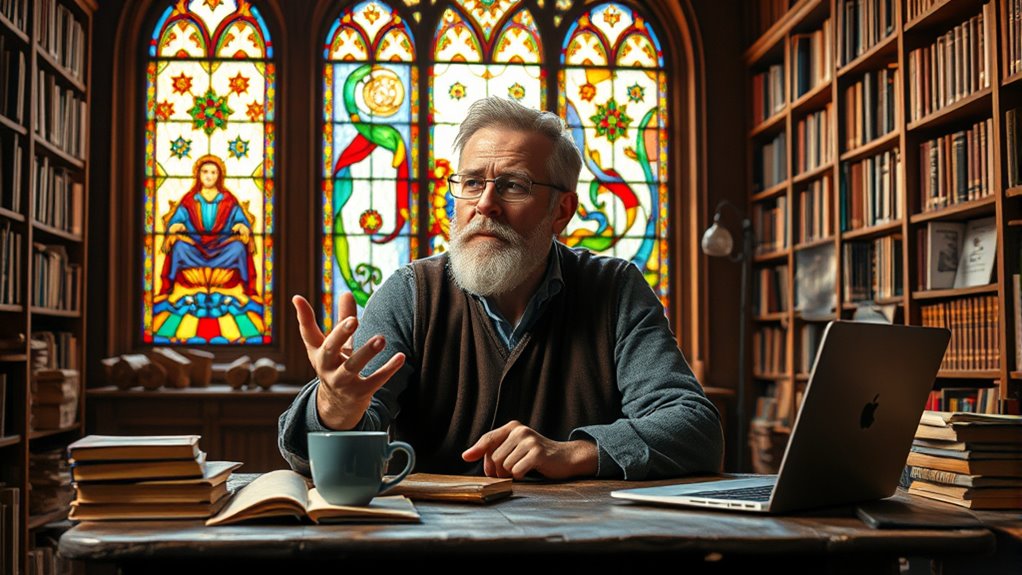Many objections to Christianity come from misunderstandings or myths. Science and faith actually complement each other, exploring different questions—how versus why. Evidence like biblical manuscripts and historical discoveries supports the reliability of Christian claims, including Jesus’ resurrection. Morality rooted in love, forgiveness, and humility remains relevant today. If you want to explore how faith offers meaningful answers to common doubts and concerns, there’s much more to contemplate.
Key Takeaways
- Science and faith address different questions: science explores mechanisms, while faith explores purpose and meaning.
- Miracles and creation stories are viewed as metaphors or extraordinary events beyond scientific explanation, not contradictions.
- Many historical scientists were believers, seeing science as understanding God’s design, which refutes the myth of conflict.
- Moral evil stems from human free will; suffering can lead to growth and compassion, aligning with Christian teachings.
- The Bible’s textual consistency, archaeological evidence, and fulfilled prophecies support its historical reliability.
Addressing the Scientific Challenges to Christian Beliefs

Many people see a conflict between scientific discoveries and Christian beliefs, but often these challenges stem from misunderstandings or incomplete interpretations. When it comes to miracles and science, many assume that miracles contradict natural laws, but they’re generally viewed as extraordinary events beyond scientific explanation. Regarding creation versus evolution, some think they are mutually exclusive, yet many Christians see no conflict—believing that God used evolution as a tool for creation. Science explains the how of the universe, while faith addresses the why. Recognizing that miracles are unique events and that creation stories can be interpreted metaphorically helps bridge the gap. This perspective allows you to appreciate both scientific findings and Christian beliefs without feeling they are at odds.
Clarifying the Issue of Moral Evil and Suffering

Why does a loving God permit moral evil and suffering to exist? The suffering origins often stem from human free will, meaning people can choose actions that cause pain and harm. Moral evil results when individuals make selfish or harmful choices, rather than following God’s good design. This free will is necessary for genuine love and moral responsibility, but it also opens the door to suffering. God allows moral evil because He values human freedom and hopes that people will choose good freely. While suffering can be heartbreaking, it isn’t without purpose. It can lead to growth, character development, and a deeper understanding of compassion. Ultimately, God’s love remains present even amid moral evil, working to bring good out of tragedy.
Exploring the Historical Evidence for Jesus’ Resurrection

When examining the historical evidence for Jesus’ resurrection, you should look at early documents that record these events, which provide valuable context. The accounts of the empty tomb and post-resurrection appearances offer compelling clues to what happened. Together, these points help build a case for understanding the significance of the resurrection in history.
Early Document Evidence
The historical evidence for Jesus’ resurrection largely relies on early written accounts that have been preserved over time. These early manuscripts, dating within decades of the events, provide essential evidence for the resurrection. While some textual variants exist among these manuscripts, they rarely alter core beliefs or facts about Jesus’ life and resurrection. Scholars have examined these differences carefully, and the overall consistency supports the reliability of the accounts. The abundance of early manuscripts also strengthens their credibility, as multiple sources corroborate key details. This textual evidence demonstrates that the resurrection was not a later invention but a well-documented event rooted in the earliest Christian writings. Such preservation underscores the significance of the early document evidence in understanding the historical foundation of Jesus’ resurrection.
Empty Tomb Accounts
Early manuscript evidence not only confirms the existence of Jesus’ life and death but also provides details about the events that followed his burial. The tomb traditions and resurrection evidence point to an empty tomb at the heart of the Christian claim. Consider these compelling facts:
- Witness accounts agree that Jesus’ tomb was found empty, challenging alternative explanations.
- Multiple sources, including early writings, affirm that Jesus’ followers believed he rose from the dead.
- The cultural context makes it unlikely that the disciples fabricated the story, given the tomb’s emptiness and their subsequent boldness.
These elements create a powerful case for understanding the empty tomb accounts as a pivotal piece of the historical evidence supporting the resurrection.
Post-Resurrection Appearances
Historical evidence for Jesus’ resurrection is considerably strengthened by the numerous post-resurrection appearances reported in early Christian writings. These appearances include doubting appearances, where Jesus gently reassures skeptics like Thomas, who initially doubted. Such appearances aren’t just stories; they’re documented in multiple sources, including the Gospels and Paul’s letters. Skeptical testimonies, like those from Mary Magdalene and the disciples, reveal honest doubts but also profound transformations after encountering the risen Jesus. These accounts often include detailed descriptions, making them less likely to be fabricated. The consistency across different witnesses and their willingness to face persecution support the authenticity of these post-resurrection appearances, making them a key pillar of the historical case for Jesus’ resurrection.
Understanding the Compatibility of Faith and Reason

Many people assume that faith and reason are inherently opposed, but in reality, they often complement each other. Recognizing this harmony can deepen your understanding of theological rationality, showing that faith isn’t blind but supported by reason.
Here are three ways faith and reason work together:
- They provide a balanced approach, allowing you to trust what’s divine while questioning what’s understandable.
- Faith guides your moral compass, and reason helps you navigate complex questions about existence.
- Faith and reason together strengthen your confidence in Christianity’s truth, revealing that belief isn’t irrational but rooted in thoughtful reflection.
Discussing the Problem of Religious Exclusivity

The problem of religious exclusivity often arises from the perception that claiming one truth excludes all others, leading some to question whether Christianity’s belief in its unique truth claims is intolerant or irrational. However, many Christians see their faith as compatible with interfaith dialogue and religious tolerance. They believe that holding to their convictions doesn’t mean dismissing others, but rather engaging respectfully with different beliefs. Recognizing that different religions address similar human questions fosters understanding rather than division. Christianity’s emphasis on love and humility encourages believers to listen and learn from others, promoting peace and mutual respect. By approaching religious exclusivity thoughtfully, you can uphold your faith’s truth claims while fostering genuine dialogue and promoting religious tolerance.
Examining the Accuracy of Biblical Texts

When you examine the biblical texts closely, you’ll find that their accuracy has been supported by numerous archaeological discoveries, manuscript comparisons, and fulfilled prophecies. The key to this reliability lies in textual consistency and manuscript accuracy across centuries. These factors demonstrate that the Bible has maintained its core message despite translations and copies. Consider these points:
- Archaeological finds, like the Dead Sea Scrolls, confirm the Bible’s historical accuracy and reinforce its credibility.
- Manuscript comparisons reveal a remarkable consistency, showing careful preservation over time.
- Fulfilled prophecies, such as predictions about specific nations and events, testify to divine inspiration and reliability.
Together, these elements reinforce the trustworthiness of biblical texts and affirm their enduring accuracy.
Responding to Criticisms of Christianity’s Moral Teachings

Critics often claim that Christianity’s moral teachings are outdated or incompatible with modern values, but these criticisms overlook the deeper principles behind these teachings. Faith and morality are rooted in timeless truths that shape human dignity and justice. Christianity’s moral guidance emphasizes love, forgiveness, and humility, which have a lasting cultural impact. The table below shows how these principles adapt across contexts:
| Principle | Modern Application | Cultural Impact |
|---|---|---|
| Love | Respect for all individuals | Promotes social cohesion |
| Forgiveness | Reconciliation efforts | Reduces conflict |
| Humility | Ethical leadership | Fosters trust and integrity |
These values influence modern society, proving that Christianity’s moral teachings remain relevant and impactful today.
Navigating the Perception of Christianity and Science

Many people perceive a conflict between Christianity and science, often viewing them as mutually exclusive. However, this is a misconception rooted in the myth versus history debate. Faith and science can coexist when you see science as exploring how God created the universe, not contradicting His existence. To navigate this perception, consider these truths:
- Recognize that many scientific pioneers were believers who saw their work as understanding God’s design.
- Understand that myths often distort the history of Christianity, fueling false opposition.
- Embrace that faith and science answer different questions—one about purpose, the other about mechanisms—complementing rather than conflicting each other.
Frequently Asked Questions
How Can Christianity Be Relevant in a Modern, Secular Society?
You might wonder how Christianity stays relevant today. In a world filled with rapid technological advances and faith in technology, Christianity offers timeless moral guidance amid moral relativism. It provides a solid foundation for ethics and purpose beyond fleeting trends. By emphasizing love, justice, and integrity, Christianity connects with modern concerns, helping you navigate complex issues and find meaning, even in a secular society that often questions traditional beliefs.
Why Does God Allow Unanswered Prayers or Divine Silence?
You might wonder why God allows unanswered prayers or divine silence. It’s a challenge that tests your faith and patience, often leading to doubt. Remember, prayer isn’t just about getting answers but growing in trust. Sometimes, God’s silence encourages you to deepen your relationship with Him, strengthening your faith even amid uncertainty. Patience becomes essential, reminding you that divine timing is perfect, and His plans are greater than your understanding.
How Does Christianity Address Mental Health and Emotional Struggles?
You might think Christianity overlooks mental health and emotional struggles, but it deeply addresses these issues. The faith offers comfort through prayer, community support, and teachings that emphasize God’s love and healing power. Many find hope and strength in scripture, knowing they’re not alone. Christianity encourages seeking help, whether spiritual or professional, and reminds you that emotional struggles are part of the human experience and can be overcome with faith and support.
Can Christianity Coexist With Other World Religions Peacefully?
You might wonder if Christianity can peacefully coexist with other religions. The answer is yes, through interfaith dialogue and embracing religious pluralism. These approaches foster mutual understanding and respect, allowing different faiths to share beliefs without conflict. Christianity encourages love and acceptance, making it possible to build peaceful relationships with followers of other religions. This openness promotes harmony and helps everyone learn from each other’s spiritual perspectives.
What Is the Church’S Stance on Social Justice Issues Today?
Think of the church as a lighthouse guiding ships through stormy seas. Today, it embraces social justice issues through active church activism, endeavoring to reflect love and fairness. The church’s stance on faith and politics is to stand for justice, compassion, and equality, not to endorse specific parties. It seeks to inspire believers to actively engage in making society more just, shining a light on the path toward a better world.
Conclusion
As you explore these common objections, remember that over 70% of Americans still identify as Christian, showing its ongoing relevance. By engaging thoughtfully, you can better understand how faith and reason coexist, and how biblical accuracy and moral teachings stand up to scrutiny. Keep questioning, seeking answers, and you’re likely to find a deeper appreciation for Christianity’s enduring impact in a complex world. Your journey toward understanding is both valuable and ongoing.










